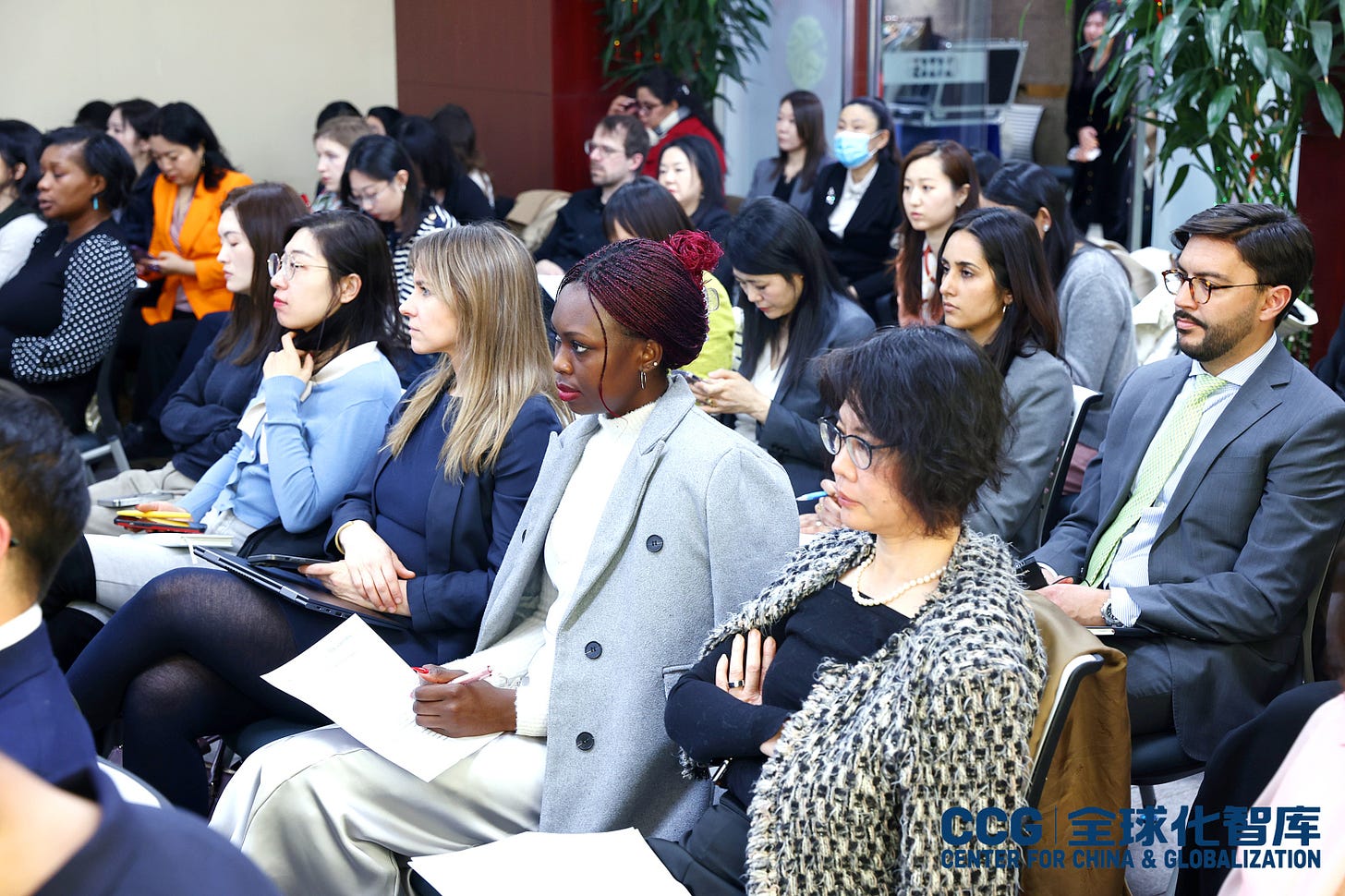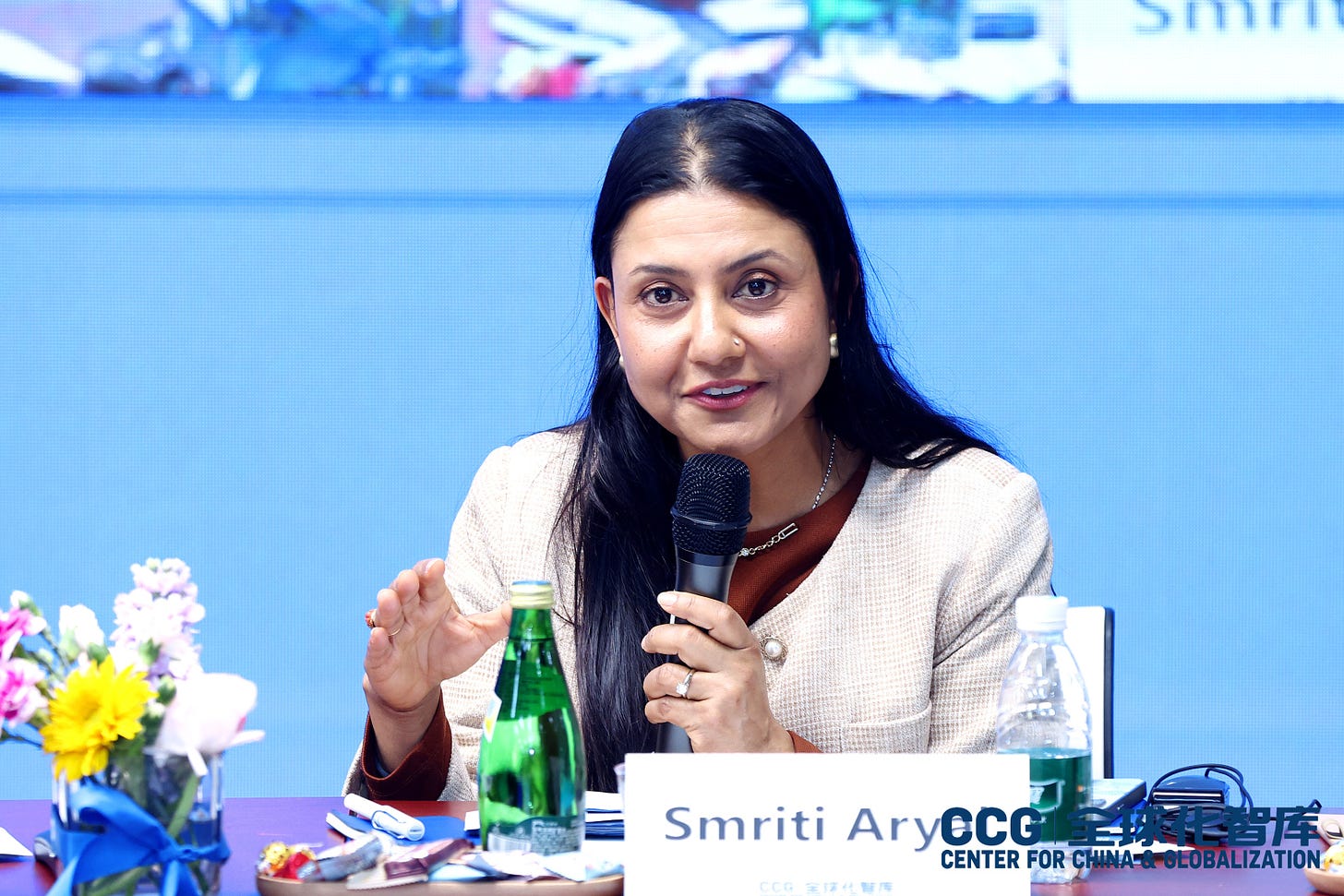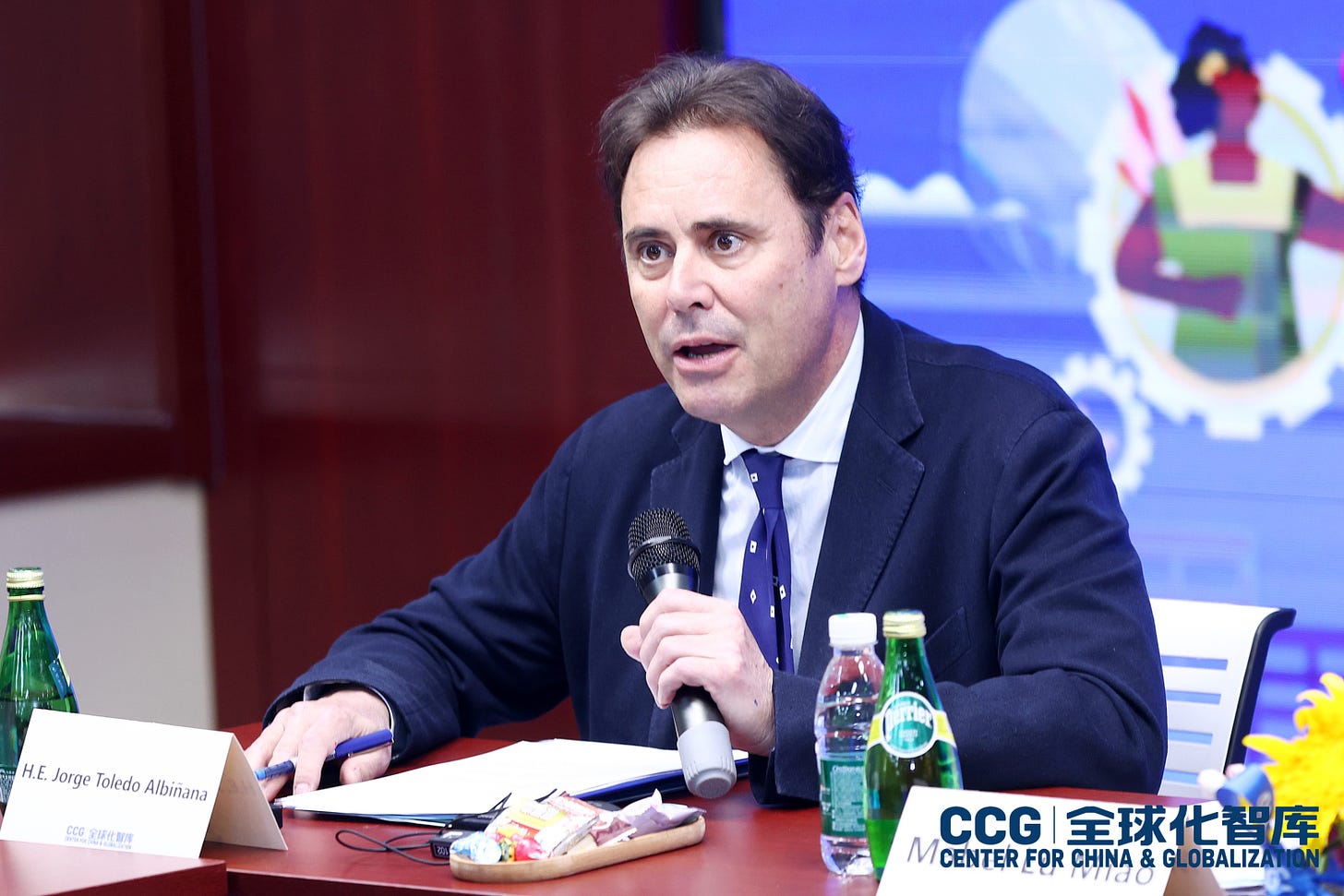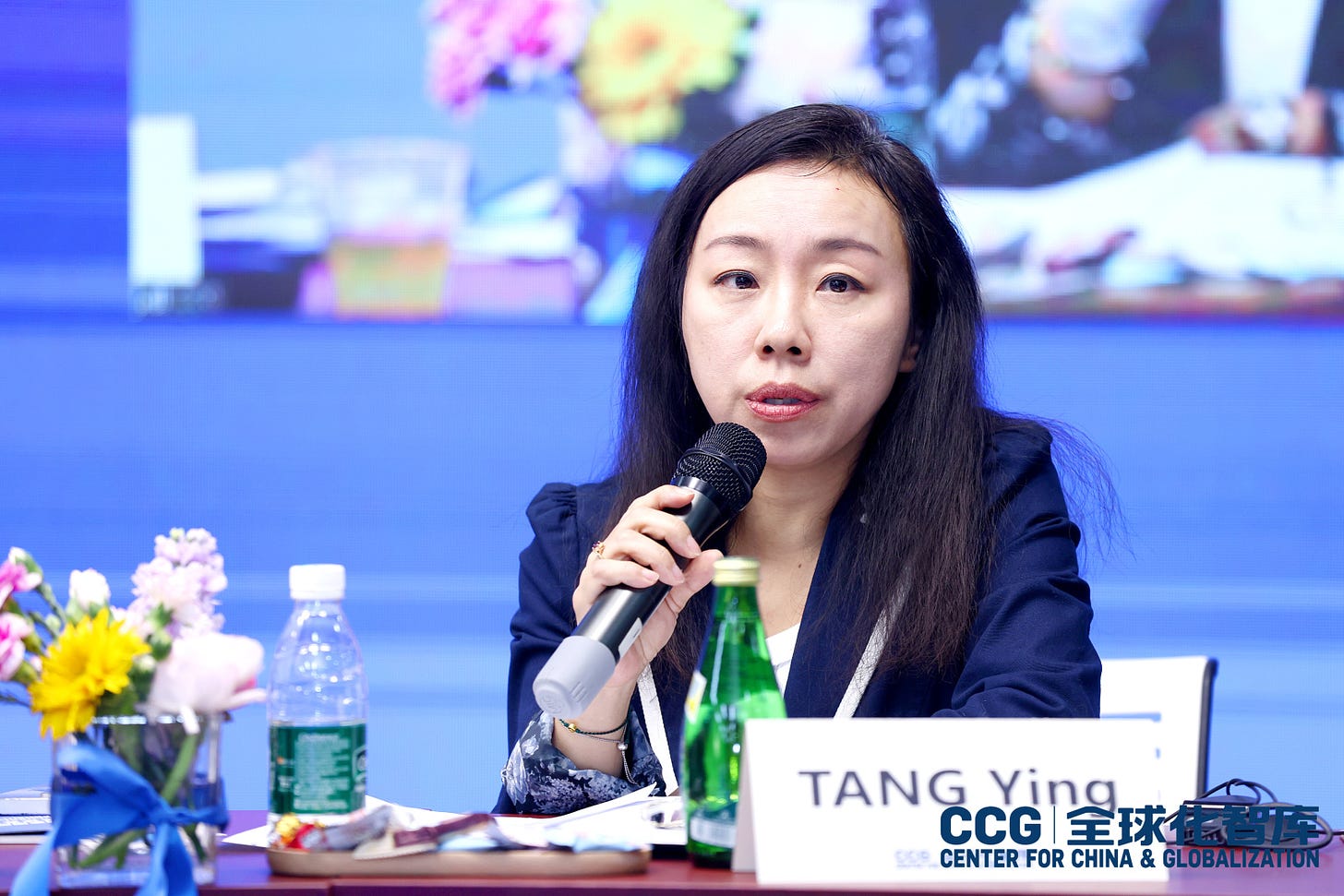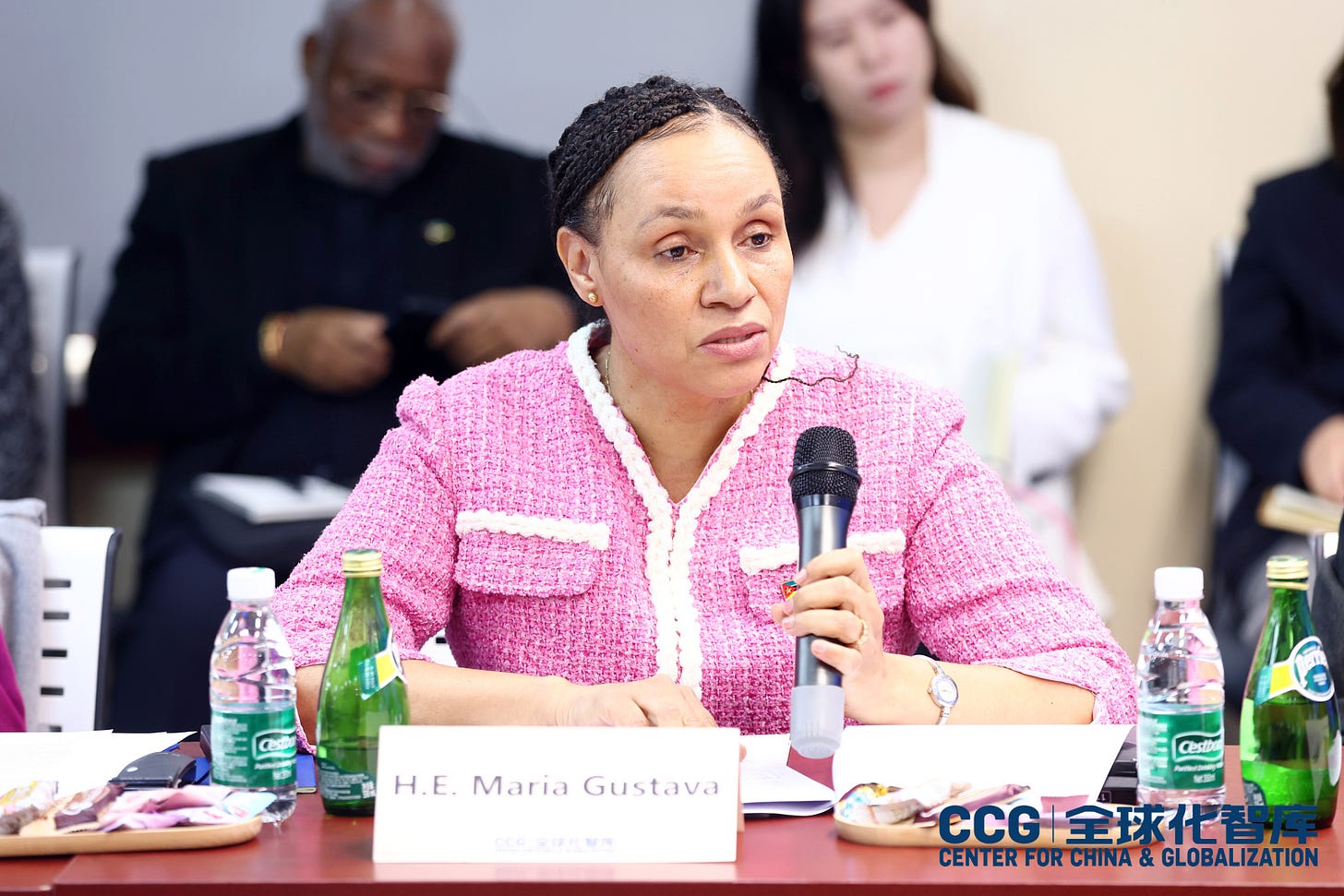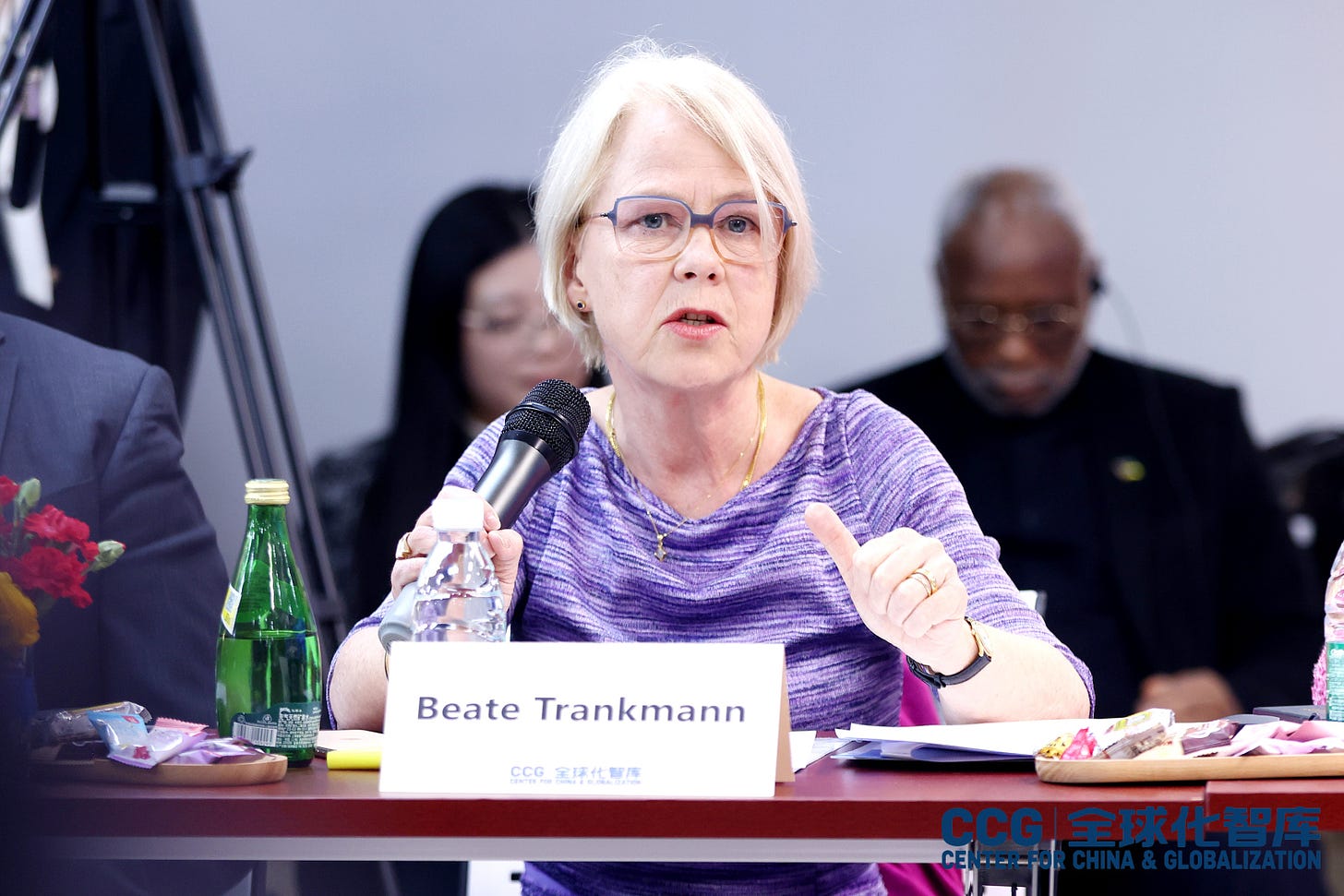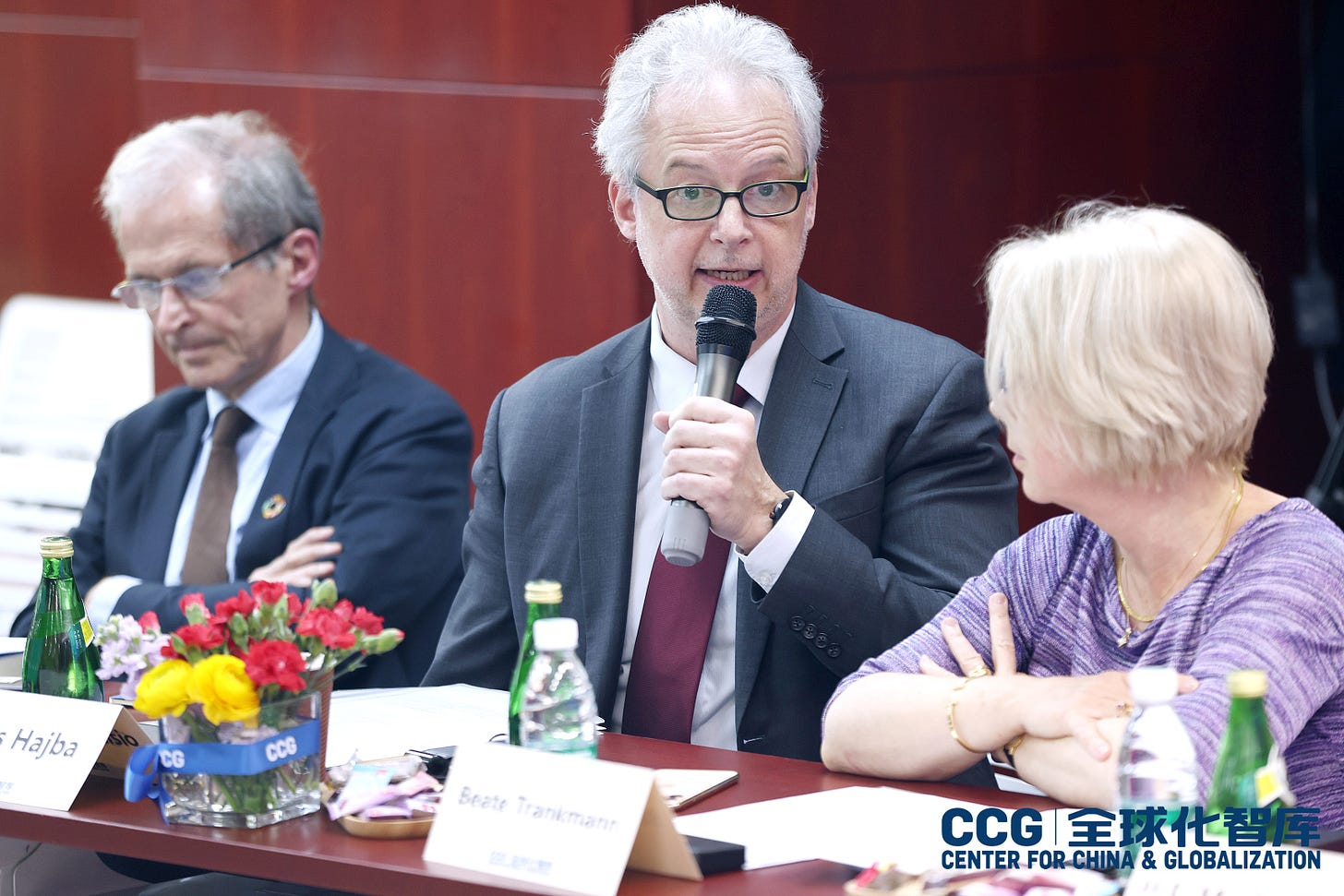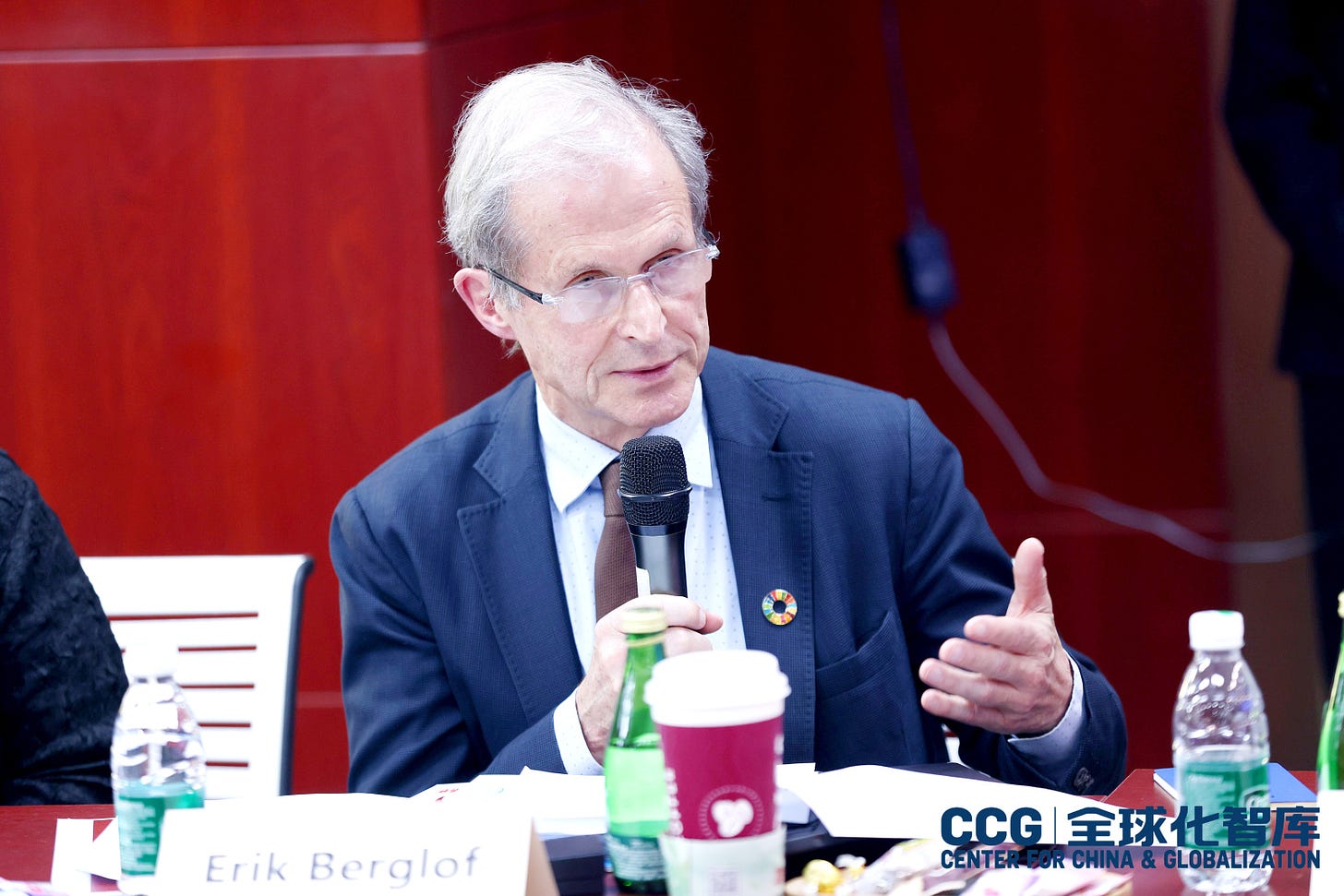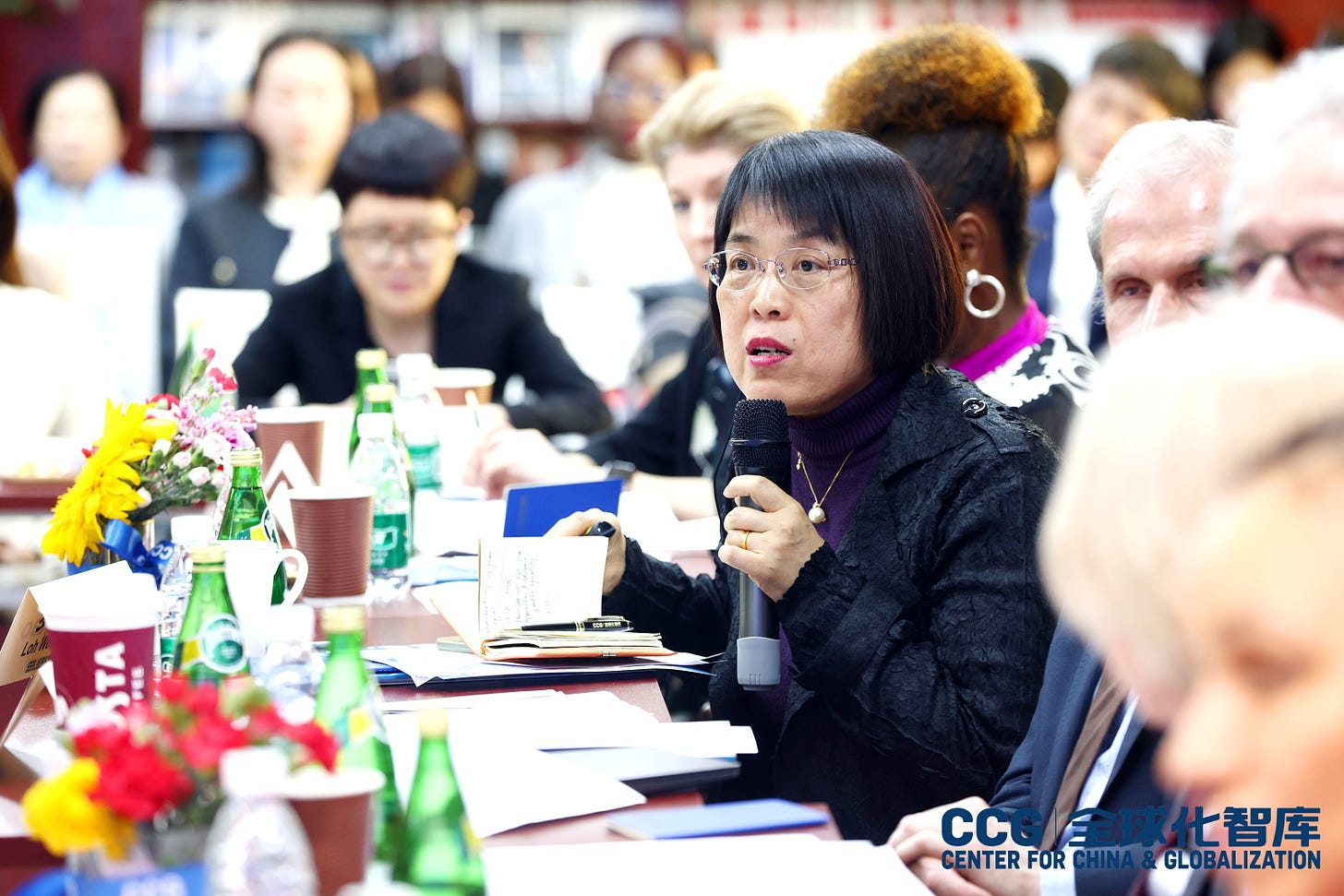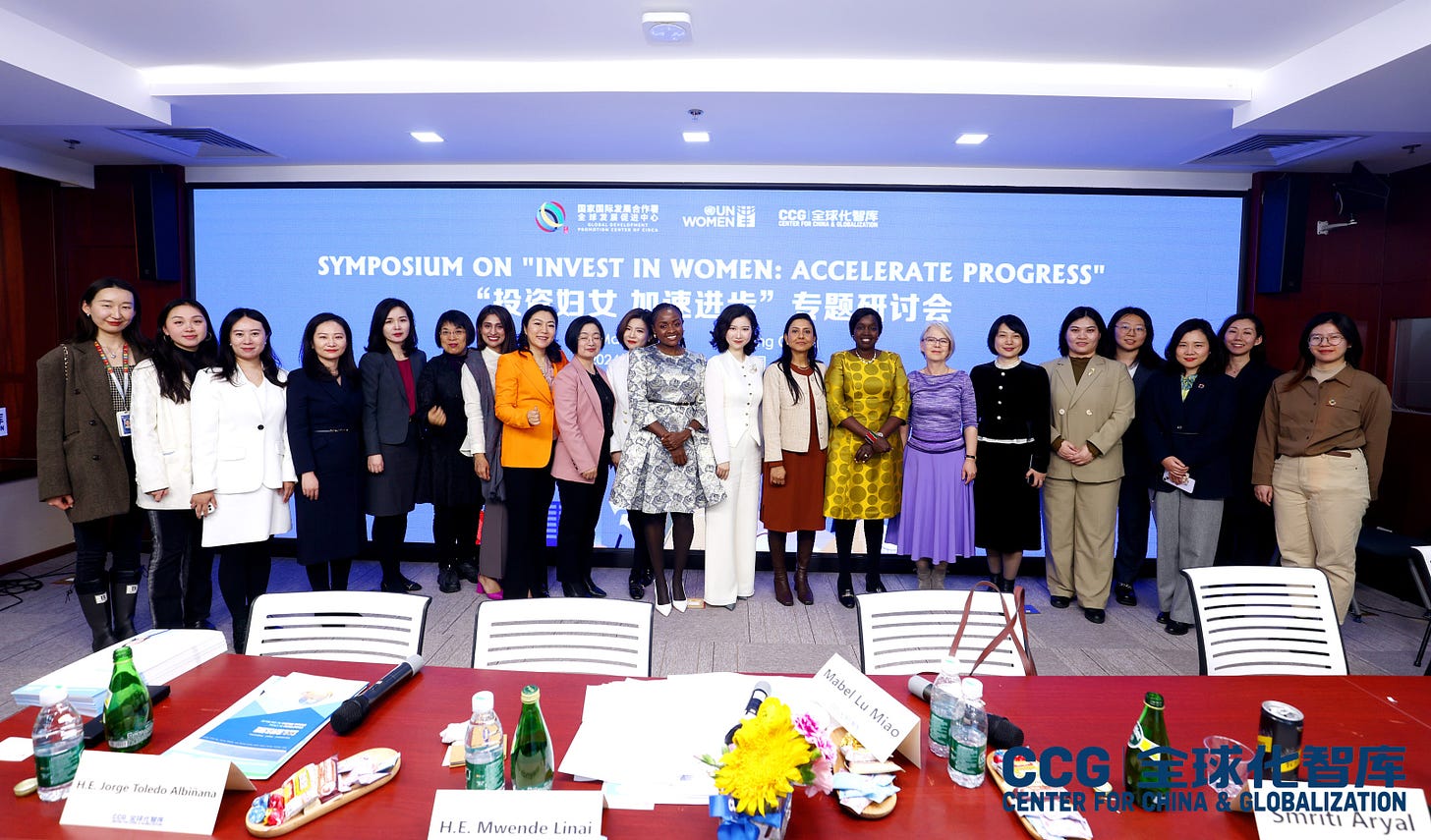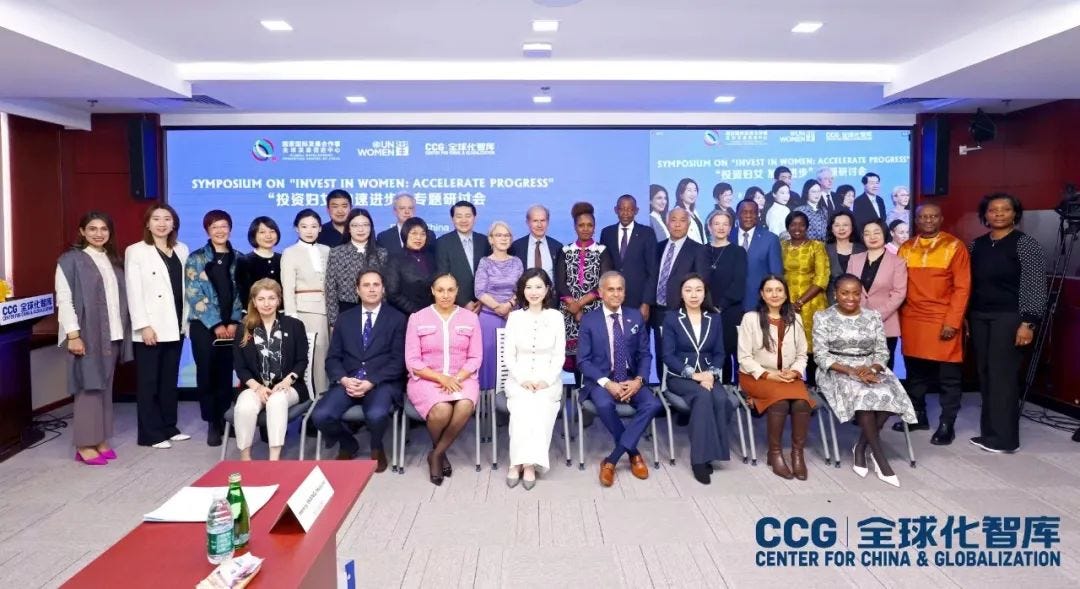Full participation of women & enhanced accountability in development cooperation are key to empowerment
Theme 1 of 3 from CCG's joint event with China International Development Cooperation Agency and the UN Women China Office in celebration of women's rights and achievements.
On March 8, 2024, celebrating International Women's Day with the goal of the achievement of SDG 5: Achieve gender equality and empower all women and girls by 2030, a symposium titled "Investing in Women: Accelerating Progress" was organized at the headquarters of Center for China & Globalization (CCG) in Beijing. This event was a joint effort by the CCG, the Global Development Promotion Center (GDPC) of the China International Development Cooperation Agency (CIDCA), and the UN Women China Office.
The symposium successfully convened nearly a hundred representatives from various sectors both within China and internationally, including government bodies, diplomatic entities in China, UN organizations, financial institutions, the private sector, academia, and civil society organizations.
Having published the opening speeches and keynote remarks from the event, the CCG Update will feature the first panel discussion, moderated by Smriti Aryal, UN Women's Country Representative in China, with contributions from:
Jorge Toledo Albiñana, Head of European Union Delegation to China
Tang Ying, Director General, Global Development Promotion Center, China International Development Cooperation Agency
Maria Gustava, Ambassador of Mozambique to China
Beate Trankmann, Resident Representative, UNDP China
Tamas Hajba, OECD Representative in China and Senior Advisor for China Affairs
Erik Berglof, Chief Economist, Asian Infrastructure Investment Bank
Li Yingtao, Professor, School of International Relations and Diplomacy, Beijing Foreign Studies University
Theme 1: Financing for Gender Equality in International Development Cooperation
Moderator - Smriti Aryal, Country Representative, UN Women in China
Excellencies,
Distinguished guests,
Ladies and gentlemen,
A very good afternoon once again!
I'm very pleased to welcome you to our first roundtable, which will focus on financing for Agenda 2030 in international development cooperation. As we've already heard - and I will not speak at length about the issue - we do have a crisis with a major shortfall in financing for gender equality for attaining SDG 5 by 2030.
So this panel is going to focus on how we can bridge the financial gap or gender equality in the international development cooperation mechanisms and systems. What are some of the lessons learned and practices? And what are some of the ways we can innovate? I'm so honored today that we have very prominent and steamed speakers from embassies, GDPC, CIDCA, multilateral banks, UN agencies, and academia joining us, both Chinese representatives as well as international representatives.
In order to get through the agenda, and we're slightly behind the schedule, I will please ask our panelists to be strictly on time. And because we want to have the opportunity to make sure we're able to have a discussion and follow-up questions and answers with the larger group, without further ado, please allow me to welcome our first speaker, Ambassador Jorge Toledo, who's the European Union Ambassador in China. Your Excellency, thank you so much for joining us today.
A brief introduction. Excellency Toledo is an expert in European Union affairs and also a very seasoned diplomat working in Asia, previously in India, in Japan, and currently in China. The European Union, as many of us already know, is a pioneer and a champion of gender equality, including for financing through its ODA and different instruments. For example, under the "Neighbourhood, Development and International Cooperation instrument – Global Europe," the EU requires at least 85% of new actions to have gender equality as a principle or significant objective in its international development assistance. The EU Fund for Sustainable Development Plus by incentivizing blended financing with the European Development Finance Institutions, aims to mobilize up to 135 billion euros of public and private financing to help partner countries to achieve SDGs. And that also includes gender equality and women's empowerment.
So Excellency, with this rich experience, my question to you - and we would love to hear your insights on EU experiences - is how does the EU prioritize gender equality in its ODA? Specifically, what are the EU's gender equality and women's empowerment priority areas? What are some of the mechanisms and instruments for operationalizing this, especially the financing perspective? I do have several questions. So maybe I can invite you to briefly touch on these and then I'll come around for the second round. Over to you, please.
Jorge Toledo Albiñana, Head of European Union Delegation to China
Thank you very much, Smriti. Thank you very much to CCG, Henry, and Mable. Thank you all. I'm always very happy to be here. I come very often, I must say. I'm invited very often and I'm always delighted.
As you said, we in the European Union are pioneers in gender equality. I would say that it is in our DNA. Everything we do has this gender equality touch. Not only touch, we do lots of things that are purely gender equality. But in everything we do, we must now have a gender equality action - not only what we do inside the EU, or not only what we do in the EU institutions where gender equality is a paramount priority, but what we do across the world.
As you see, now we have an ambitious target, which is that 85% of our new projects will have to contribute to gender equality and women's empowerment by 2025. We have for over 20 years had Gender Focal Points (GFPs) in all our embassies. In fact, I'm here with our Gender Focal Point in the EU delegation, Delphine Aupicon.
We are in the third generation of five-year gender action plans. We're guided by what we call the Gender Equality Strategy. This includes reducing female labor market participation, reducing the gender pay and pension gaps, promoting equality between women and men in decision-making, combating gender-based violence, and promoting gender equality and women's rights. And when it comes to financing, as you say, our Global Europe Instrument, which is an instrument that we're promoting all over the world for our extended action, will have this 85 % objective that you mentioned, with a budget of €79.5 billion over seven years. It will contribute to all of the SDGs, but SDG 5, gender equality, will be one of the most prominent in our action.
We also promote gender equality in all our actions that we do with our member states, what we call Team Europe actions. And as you know, the European Union and our member states, we're by far the largest provider of aid in the world. And as I say, everything is painted with gender equality.
Moderator - Smriti Aryal
Thank you so much. I think you've raised very important two points. One is the importance of financial targeting as a commitment for countries who are resourcing to the partnering countries for development assistance. The second is having a targeted strategy and plan that focuses on gender equality if I can pick up very quickly on two points.
If I can follow up with a question about the Spotlight Initiative in 2017. And I've seen the journey of Spotlight because I've been with UN women and we've been a major partner in implementing Spotlight together with UNFPA, UNDP, UNICEF, a number of agencies. I know this fund was created to end violence against women and the trafficking of women. Can you share some lessons and insights on why this fund was created, and how it has contributed to an achievement in the reduction of violence against women, but also looking at aid effectiveness, has it been effective in achieving some of the other development goals? Through women empowerment, by addressing systematic barriers that women face, we not only empower and support women but also make development outcomes better for all human beings. So, if you could speak on that, that would be great.
Jorge Toledo Albiñana, Head of European Union Delegation to China
Well, as you said, we have been working since 2017 with the UN for this Spotlight Initiative, which we think is a major initiative for us, for the EU to promote gender equality and a very good example of collaboration between us and the United Nations.
We're supporting this initiative with a multitude of actions around the world. We have seen through this initiative that social media remains an effective way to challenge harmful gender norms and stereotypes and to combat violence against women and girls. The use of modern communication channels to reach more people, especially the young generation is very important. We would like to see more outcomes, and more results. We are working with the UN Women in China. In fact, I visited last year a very important project we have to eliminate violence against women and we intend to continue to do it in the next few years.
Moderator - Smriti Aryal
Thank you so much, Ambassador Toledo. If I can pause there for a moment and turn to DG Tang here, who is our second speaker. So please welcome Madam DG Tang from GDPC, CIDCA, if I may just briefly introduce you. You have a vast experience in China's foreign assistance. She is a Director General of the Global Development Promotion Center of CIDCA and has been leading South-South cooperation in foreign assistance for China, working closely with bilateral and multilateral development partners, including the United Nations. It is my pleasure to have you here today. Thank you so much for being a co-host and also being a panelist in this session.
My question is about China's foreign cooperation policy and approach. In 2021 CIDCA's white paper on China's international development cooperation, we saw that women's empowerment is a key priority. It would be great to hear from you how China's recent cooperation engagement on gender equality has been rolled out and what are some of the specific areas under this portfolio that you're supporting in other partnering countries.
Tang Ying, Director General, Global Development Promotion Center, China International Development Cooperation Agency
I will answer the questions in Chinese. As time is limited, I will give as much information as possible.
Speaking of foreign aid from China, take the bilateral channels as an example, we have already done health projects for women and children in over 100 countries including Cambio, Sierra Leone, Malawi, and Cabo Verde. These programs effectively promoted the hygiene and health of the women and children in those areas. At a multilateral level and within the framework of the Global Development and South-South Cooperation Assistance Fund, we've collaborated with a dozen international organizations, having already conducted over 100 programs in more than 50 countries in Asia, Africa, and Latin America. Of course, they are not entirely in the area of women and child care, which, however, is a very important focus of our work.
Let me give you an example. We collaborated with UNICEF to provide assistance to Somalian women and children suffering from severe malnutrition - 250,000 local women and children if I remember correctly. On human resources development, over the years, we have invited over 30,000 women in developing countries to receive training in China, which contributes to women's capacity building. We also frequently provide aid in small amounts.
Moderator - Smriti Aryal
Thank you so much for sharing those concrete examples. Indeed, women's health and nutrition have a huge impact on their whole outlook in life. So that's a very important investment. Also, under SDG 5, sexual reproductive health is an area that is underfunded.
I was very excited to hear, during your opening speech, you said promoting gender equality is critical to achieving SDG 5 and also a priority area of the GDP Center. So I'd love to hear how you see opportunities and pathways for China to increase its investment in promoting gender equality through development or cooperation, especially under the GDI banner.
Tang Ying
Thank you. Because Aryal mentioned the GDI, please allow me to elaborate more on the initiative. The Global Development Initiative (GDI) was proposed in 2021 by President Xi Jinping at the 76th UN General Assembly. I am often asked, what's the difference between SDG and GDI? How do they complement each other? My understanding is that GDI is aligned with SDGs in terms of core concepts and goals. And in terms of the logic of global governance, they're also interconnected and complementary to each other.
The GDP Center, as a dedicated agency for the implementation of the GDI, is committed to building a platform under the principle of building and benefiting together.
So what is it that we do? First, concept promotion. Second, joint research in innovative pathways. Third, bringing together resources. Fourth, we not only talk the talk but also walk the walk and foster joint actions. These are the four major functions of the GDP Center.
Next, as Aryal mentioned, what do we have in our toolbox? The GDP Center has eight tools. But due to the limitation of time, I will only introduce two that people are most interested in, that is, the Global Development Project Pool [全球发展项目库] and the Global Development Fund Pool. I will also introduce what these two pools can do for the interests of women and children.
First, the Global Development Project Pool, which has two sub-pools. The first is the Achievements Pool [成果库], and the other is the Incubation Pool [孵化库]. The Achievements Pool is aimed at sharing successful projects of the GDP Center, which helps to acquire more resources for our successful endeavors and to replicate them in more regions and villages. As to the Incubation Pool, the GDP Center proactively helps projects within the Incubation Pool acquire policy support and resources needed for the incubation of projects. As of today, we have over 2,000 projects in the Incubation Pool. We are also currently reviewing the addition of another 500 projects. Those approved will receive support from either the Chinese government or the partners of the GDP Center to push forward their implementation. Many of them are related to the health, education, and employment of women and girls.
I can give you two examples. Just yesterday, as a matter of fact, I had a tripartite dialogue with the Forbidden City Museum and colleagues from Egypt. We discussed how we could foster cultural exchange programs to promote local women in Egypt to design, produce, and sell cultural derivative products. Where do we get intellectual resources? Well, that will come from the professional team of the Forbidden City Museum. The financial support, on the other hand, will be shared by the Forbidden City Museum and the GDP Center's Fund Pool. With joint forces, we can help local women in Egypt improve their capacities and employment opportunities.
This is also a mutual exchange. While we help our partners, we also learn from our Egyptian colleagues and promote cultural exchanges. So this is a win-win and a mutual learning process.
Another example also came from yesterday. Last night, I had a productive talk with colleagues from the United Nations Office for South-South Cooperation (UNOSSC) in New York. We were preparing to launch a capacity-building program specifically for women in China's neighboring countries in Asia. The UNOSSC will contribute a portion of the start-up funds; the CIDCA, including the GDP Center, will help raise the remaining part. Due to limited time, I'm not going to elaborate on the other pool, which is the Fund Pool. Thank you.
Moderator - Smriti Aryal
Thank you. It's really exciting to hear about the new initiative for women in Asia with the South-South Cooperation Office, but also to hear about so many other projects you're focusing on. I think you also highlight the importance of looking at co-financing mechanisms as one of the ways of expanding resources because the needs are so big and we need to look at innovative ways of working together such as the private sector. Thank you.
Tang Ying
I see many people are interested in financing. So where does our Fund Pool source from? First, the fiscal budget of the Chinese government. Second, the Global Development and South-South Cooperation Assistance Fund. The third source is our 12 billion U.S. dollar cooperative agreement with banks, including Chinese and multilateral banks, which is exclusively dedicated to the implementation of projects within our Project Pool. Five of our projects are being implemented right now. Lastly, the Fund Pool also sources from our partners and enterprises. So this is a channel with diverse sources. Thank you.
Moderator - Smriti Aryal
Thank you for your important points on a diverse need for resource mobilization and looking at co-financing mechanisms. Because we're really behind the times, I'm gonna move on. Thank you so much, DG Tang.
Moving on to Her Excellency Maria Gustava, who's the ambassador of Mozambique to China, she has previously engaged in multiple portfolios of the country's foreign policy which focused on Asia and Oceania, multilateral cooperation, and inter-governmental processes before she served as ambassador to Indonesia and to the Republic of Korea. Welcome, Your Excellency. So good to have you here. Thank you so much.
So Mozambique has made considerable gains in promoting gender equality, but as in other countries, of course, there are gaps and challenges. And I know that in political participation, there has been a big progress. As of February 2021, you have 42.4% of seats in Parliament held by women. Across legal policy frameworks, there is a very strong focus on gender equality. And clearly, the needs for resources are equally big.
Your Excellency, given your abundant experience in Africa and Asia, what is your take on how countries in the Global South can benefit from development cooperation, South-South cooperation, and triangular cooperation for advancing SDGs? And what are some of the enablers to make sure that we can make this cooperation successful on the ground?
Maria Gustava, Ambassador of Mozambique to China
Thank you very much. First of all, I want to thank you, the CIDCA, UN Women in China, and CCG, for inviting me to this symposium. Also, I want to take this opportunity to express my tribute to all women across the globe, especially those being affected by armed conflict. Indeed, Mozambique has made a lot of progress and we can see the positive impact of gender-equal rights in the reduction of illiteracy and mortality rates and also in terms of increasing the numbers of women in the leadership of the country.
Based on our experiences, I will say that development cooperation through official development assistance, alongside South-South cooperation and triangular cooperation, are vital tools for advancing SDG 5 in developing countries like Africa and Asia. The essential source of financing the policies, strategies, and programs for gender equality and woman empowerment, particularly in advocacy, education, capacity building, political and economic empowerment, and also in transforming social and cultural norms, addressing discrimination and harmful laws, violence, and other fact that contribute to gender inequalities, are increasing in vulnerability.
Indeed, as was said by the CIDCA representative, South-South cooperation and triangular cooperation have a supportive role in addressing the common challenges based on solidarity, cooperation spirits, and using experience, shared best practices, expertise, and shared resources. They provide the best solutions in many areas such as education, health, agriculture, and rural development by unlocking the best experience and lessons learned to address development challenges. And also, I want to agree that we still need a lot of resources in our country to pursue the policy of gender equality. We need to have new and innovative forms of mobilization for resources, including the expansion of the range of donors and actors from private and public sectors, multilateral associations, and others to be involved in the mobilization of resources.
Also, I believe that the UN has a very critical role in coordinating, planning, and monitoring the process. If there is no coordination and monitoring, there can be some fragmentation and overlapping. And so it [mobilzation of resources] shall be based on the competitive advantage of each one to have more impact in the society. So I wanted to say that in terms of the mobilization of resources, that is very important.
In terms of the impact of cooperation on the ground, it is really essential to establish coherent and effective collaboration and coordination among all stakeholders at different levels. The full participation in the identification, classification, and implementation of programs is important because it can bring ownership, because we can even involve the locals, they know what they need is not what's coming from outside. So if everybody is part of the whole process, there's more impact. I think it is very important to have this coordination and include the women's organizations and civil society groups to sponsor their needs and priorities.
Also, there is a need for more accountability and monitoring processes on gender equality in developing cooperation activities, which means we need effective collaboration and cooperation from all, including donors' civil society, academia, regional and multilateral agencies in pursuing the common objectives and goals to attain the equal rights for all women.
I'm almost coming to the end for this to say that we need to work all together and include everybody. More resources are needed. All forms of cooperation are important to attain equal rights and gender empowerment. Thank you very much.
Moderator - Smriti Aryal
Thank you, Ambassador Gustava. I think you've raised two new points that haven't come up yet. One is the rule of the UN and the necessity to engage the whole of society that the participation of people and stakeholders is really critical in the achievement of the goal. And the other point is around accountability. If I understand correctly, what you're trying to say is money alone is not enough; we need to make sure that there are tools, systems, processes, and standards in place to ensure accountability to the commitment that is being made.
And I hope we can touch a bit more on that in our second session as well because there is a lot on the national policy and commitments from within the construct and how that comes through is in synergy with the international risks that would involve. Thank you for raising those very important points. I will come back to you for the second round. I'm really hoping we have the time to do so. But thank you for now.
And now, to my dear colleague from UNDP, Ms. Beate Trankmann, who is the Resident Representative of UNDP here in China. Beate, welcome. She is, as I said, the Resident Representative of UNDP and she's also a co-chair of the Global Partnership Group under the UN Sustainable Development Cooperation Framework in China.
At the UN in China, I think Sid, our RC already mentioned, that gender equality is an important priority across the board in everything we do. It also includes the UN's international development cooperation and South-South cooperation engagement with China and development partners encompassing partnership building, advocacy, policy dialogue, norms, and standards. So based on a huge past experience that you have personally working in so many different countries in Asia and around the world, and your current role as the co-chair, Beate, it would be great if you could enlighten us a bit on how you see the opportunities and pathway for the UN and China to work more closely together in advancing gender equality and generating more resources for investment in China through China's international development cooperation engagements at both policy and programmatic levels. Over to you. Thank you so much and warm welcome once again.
Beate Trankmann, Resident Representative, UNDP China
Thank you. Good afternoon to all and very happy International Women's Day. Really great to be here. Now, let me preface my reflections by saying that gender equality, apart from being a fundamental human right, I think, is also the key ingredient to sustainable development and the foundation for a peaceful and prosperous world. And of course, investing in women also makes absolute business sense. We know that when women and girls are given equal opportunities, we see profound impacts on poverty alleviation, health, and education, but also on overall economic growth.
Let me just give you one data point to illustrate that. Closing the gender global employment gap would raise GDP by nearly 20% on average across countries, and that could double the current global GDP within the decade. That's the World Bank figures. So if women started and scaled new businesses at the same rate as men do, that could bring gains of 5 to 6 trillion dollars to the global economy. So that's just to illustrate the development impact.
Now, UNDP, as a multilateral development actor, strives to incorporate gender across all aspects of our work to achieve sustainable development around the world. Gender equality is one of the six priorities of UNDP Strategic Plan 2022-2025, and that focus is underpinned by a dedicated Gender Equality Strategy that highlights entry points for gender empowerment and equality across the other five pillars.
I think one interesting example of this type of cross-sector work is the one that we're doing through our "Equanomics" initiative that supports finance ministries and tax authorities in 26 countries around the world to make sure that fiscal policies actually work for women and gender. Now we also have been talking about institutional culture - Agenda Equality Seal Certification Program that guides our country offices in incorporating gender considerations into our projects. At UNDP China, our project expenditure directed towards gender equality and women's empowerment has increased from 19% to 79% since we started participating in this program. So that's a very proud achievement for me, personally.
Now let me turn to the UN in China. I think in 2021, the release of China's third white paper on international development cooperation marked in fact a historic shift because it prioritized for the very first time gender as a key focus and priority area. And I think that demonstrates China's commitment to integrating gender into its broader development cooperation strategies and, of course, is an acknowledgment of the importance of gender equality in promoting inclusive, sustainable development internationally by China. As the UN, we welcome this shift. We are actively engaging and supporting China to realize these commitments.
Let me give you a few quick examples. At the policy level, the UN, led by UN Women, conducted a gender analysis and forecast of the Dhaka Action Plan, helping to incorporate yet again the first emphasis on gender equality and women's empowerment. At the pragmatic level, we have worked with MOFCOM, but also, of course, with CIDCA, a very important partner for us in advancing gender equality through South-South Cooperation. We, for example, provided skills and equipment to women in Bangladesh to encourage entrepreneurship in the government sector. In Lebanon, we have equipped women entrepreneurs with access to various e-commerce platforms and supply chain tools. I think what is important here is that these initiatives not only promote, of course, livelihoods, and support the recovery from COVID-19, but they also strengthen the overall resilience of women against external shocks when we know that women are actually more vulnerable to this type of shocks and recover at a slower pace.
As the UN, we're also currently starting a multi-year project with the European Union to inform policy and practice of China's international development cooperation for enhanced SDG impact. And let me use the opportunity to thank Ambassador Toledo and the EU for engaging with us on this initiative.
Now, I think to close, for China to advance and consolidate this emerging strong gender focus in its development engagement, a comprehensive approach will be needed that cuts across all stages of the programming cycle, both from design and implementation, but also how we monitor and measure impact. So Madam Tang Ying, we very much welcome the efforts that CIDCA has been making to develop dedicated gender indicators as part of the new monitoring and evaluation framework that you put out last year at the Sunshine Forum, and we look forward to, hopefully, continuing to engage with you on the rollout of this framework.
So we've heard the writing's on the wall. We won't achieve SDG 5 if we exclude half the world's population, their ingenuity, and their potential to contribute. And this is why it's important to enhance our efforts and invest in women. Thank you very much.
Moderator - Smriti Aryal
Thank you, Beate. That was very well said. Just two very important points I picked up, the last one being the importance of monitoring and evaluating so that we know we are heading in the right direction, that there is progress being made, and that it is effective. So it's part of the whole package from planning, designing, and resourcing to monitoring and evaluation. A very important point. I think you also highlighted the importance of intersectionality and looking at different ways to address different vulnerabilities women face. And congratulations to you on the progress made in using the Gender Seal. If I can pick from different examples, it is clear that we need to be intentional about gender-targeted programming. It is not enough just to do mainstreaming because targeted programming will accelerate progress toward ending the gap that we see today.
Thank you. And now, I think just on monitoring and evaluation, I move to the right person. Welcome Mr. Tamas Hajba who is the OECD representative in China and Senior Advisor for China Affairs. He brings past experience working on the OECD DAC and non-DAC actors including with China. Welcome and thank you for joining us today.
So my question to you: what is your overall take on how gender equality and women's empowerment can achieve development effectiveness in the context of developing cooperation? And can you share with us any gender toolkits and policy instruments that have been very useful, and have been tried and tested? Thank you.
Tamas Hajba, OECD Representative in China and Senior Advisor for China Affairs
Thank you very much and thank you for inviting me and OECD to speak at this event. My heartfelt greeting to everyone on International Women's Day. I hope it's not going to be only the occasion of the 8th of March, but hopefully, this is gonna be an extended International Women's Day since we need to integrate it and have it in our everyday life, gender equality, and women's empowerment.
Indeed, development cooperation should integrate gender equality. This is not only a key component of sustainable development as Beate just mentioned. The reason why we're talking about development cooperation as a main tool, a very simple reason, is that ODA development assistance remains a major source of financing of gender equality.
Just to note 43% of bilateral allocable ODA had gender equality as a policy objective. Of course, the major bulk of this ODA was integrated into gender equality programs which have gender equality as a policy objective. But as Beate already announced before, only 4% of these bilateral allocable ODA was dedicated to programs with gender equality as the principal objective. So there is a long way to go.
There's another thing that came to my mind is that gender-equality-related ODA is allocated to different sectors - everybody knows women's employment, education, and healthcare. But the sectors that have the lowest share of aid with gender equality objectives are humanitarian aid and energy. And I think especially the former is a shocking fact.
Now, enhancing development effectiveness and integrating gender equality. Enhancing gender equality yields a lot of benefits that significantly enhance development effectiveness.
Let me just go through a couple of points where we see that gender equality is improving the effectiveness of development cooperation.
First of all, this has improved targeted intervention. Recognizing gender dynamics enables interventions addressing the specific points of women and girls, thereby addressing the root causes of gender disparities effectively.
This is also for enhanced impact and sustainability, and economic growth and inequality reduction. As for the latter, as just mentioned by Beate - let me also share with you some obvious data in this regard - closing the gaps in labor force participation and working hours will result in an average boost of 9.2% in GDP across OECD countries by 2060, which is adding about 0.2 percentage points to average annual growth.
Social cohesion and stability. Promoting gender equality fosters inclusive societies, reducing tensions and promoting peace by empowering women in decision-making processes.
Enhanced accountability and transparency have already been mentioned, so I don't wanna go into details on that.
Last but not least, as Beate mentioned, fulfillment of human rights and dignity.
Coming to the policy tools and instruments, we see a great variety of diversity across the board. I mean, all countries have their own system and their own ideas and approaches. So what the OECD has been doing for many years is that we tried to establish instruments and some tools to help governments and also the organizations involved in development cooperation and gender equality to have some guidance, some kind of mutual principles. I'd like to pick only two of them.
One is the gender recommendations of the OECD. That is a robust, large framework for promoting gender equality and women's empowerment across various sectors. And it's already been mentioned, that the key elements encompass policy frameworks, education, employment, social protection, political participation, and data collection. This is providing comprehensive guidance for integrating gender equality into development cooperation.
The second tool is called the OECD Development Assistance Committee's (DAC) gender equality policy marker. This is a statistical tool to record development activities targeting gender equality. I think apart from being a good instrument to check to what extent the resources that we're spending will pursue the goal or reach the goals of gender equality, this is also very helpful to use in our monitoring and evaluation.
So just coming to evaluation, in a very brief manner, I think we all agree that there are major principles used by a lot of agencies and countries across the board. The OECD DAC has the so-called criteria of evaluation, relevance, coherence, effectiveness, efficiency, impact, and sustainability. Of course, all of them can target the gender equality perspective.
Now there are similarities between different approaches of international organizations and, of course, countries. And among these commonalities, I would just focus on ethical, inclusive, participatory evaluation approaches. Of course, locally based evaluators and researchers, are the ones who should be involved in this evaluation and monitoring process as well.
All this looks very good. But if we go down to practice, then we will see that there are a lot of issues that lie in the details in terms of evaluation and monitoring. Let me just highlight to you three points of them.
For instance, measuring gender equality change, and especially gender transformative change is unlikely to be achieved within the timeline of a typical project. Like other complex social changes, changes in gender relations can often be unpredictable. Okay, some unpredictability. So changes that seem to be positive at first sight can deteriorate at a later stage.
The other one is result reporting. We like it because, of course, that can encourage a lot of political and financial support for policies, programs, and projects. But at the same time, the burden of reporting on different stakeholders - of course, we're not talking about large multilateral organizations that have the capacity to deal with it, but for smaller development cooperation actors, this is a huge burden - data collection, data monitoring, and data presentations.
Last but not least, as I already shared, for data collection and data valuation, ethical considerations must be front and center. We have to admit that it is not only sometimes the lack of data that we deal with because in many contexts where evaluations are undertaken, support for gender equality is really, really limited. So I think for international cooperation and close cooperation, what we really should consider is data sharing and building databases that we can use for monitoring of the implementation of these projects. I'll stop here. Thank you very much.
Moderator - Smriti Aryal
Thank you very much, Tamas. I mean, you've raised so many very pertinent points about effectiveness and how we measure transformation in gender equality. In the interest of time, because I realize we're already 10 minutes behind and we have two more speakers, I will not summarize yet. Hopefully, we'll have a chance to go back and have conversations on some of this. Without further ado, may I please invite Mr. Erik Berglof, Chief Economist of the Asian Infrastructure Investment Bank (AIIB).
It is my pleasure to welcome you, Erik, here today. Thank you so much for joining us. We look forward to hearing from you on how AIIB, as a multilateral development bank, incorporates the gender lens into its policies, operations, and programs to impact investment and development cooperation, especially looking at innovative financing as an instrument going forward.
Erik Berglof, Chief Economist, Asian Infrastructure Investment Bank
Thank you very much. And colleagues, thank you for inviting us to this important event and to this celebration of International Women's Day. I think International Women's Day is not only an important opportunity to celebrate the contribution of women but also an important opportunity for us to reflect on what we're doing about this agenda and where we are on this journey towards achieving SDG 5.
I represent an institution that is still quite young, and we have been the fastest-growing high-flyer in history, I think, but we're still very much at the beginning of our journey. That also goes to what we do in this space of gender equality. So I'm here to explain what we do, but of course, also to listen and learn from what others are doing. I would say something a bit about our thinking, and I would say something a bit about our action, and what we do in terms of framework, also specifically on a couple of examples of investment.
You may wonder: why is the Chief Economist here to talk about this topic? We do recognize it's absolutely crucial and that these are issues of rights and freedoms. It's about, of course, violence and making sure that women are treated fairly. But it's also very fundamentally an issue, and Beate's comments very much illustrate this, about economic opportunities and the equality of opportunities. My experience is that this is actually a way that we can really help transform thinking, and the economic pathway is also a pathway towards achieving greater freedom, achieving a greater choice for women, and giving them their rightful position in society.
I had a previous life in the European Bank for Reconstruction and Development. We didn't pay much attention to this for a long time. We work mostly in Eastern European countries where maybe, this was not the No. 1 topic. But then we were asked to go into Turkey and the Middle East where 80% of women are outside the labor force. That forced us to rethink completely what we were doing and also bring out what waste it is to have so many people outside the opportunity to contribute to, within the formal economy, developing businesses and contributing in different ways. So from my experience, the sort of equality opportunity approach is a very powerful way of pursuing the interests of women.
Very much taking in this economic inclusion approach to approaching this agenda, we are implementing our framework to look at every single project: how can we use that project to promote this agenda? This is something that, from my experience, again, pinpoints lots of pictures not just mainstreaming, but it's about seeing what the opportunities in this project are to enhance this agenda.
I'll give you two examples of how this could be reflected in what we're doing. One is a direct investment that we are making in something called the Southeast Asia Women’s Economic Empowerment Fund. It's a private equity closed-end fund with a specific objective of pursuing women's leadership, identified as supporting small-and-medium-sized enterprises run by women. We have been working with the management of this fund to develop a specific incentive scheme to reward, a measurement of how much they have helped women-owned and -led businesses, how much they can show concrete evidence of gender improvement over time, and also relate it to climate disclosure. So we are really trying to find a powerful framework that could allow us to monitor and support the efforts of this fund that is working across Southeast Asia.
The other example, which is maybe more typical for what we are doing and refers back to what I said about using this framework to look at all our investment is, that we were working on the second phase of the metro in Mumbai. A very important part of this was, as a bank that invests in infrastructure, the more we can get women to use the infrastructure that we invest, the more economic benefits but also financial benefits for this particular investment.
It turns out, when you ask women, women have much longer journeys typically on the metros because they wanted to avoid certain parts of the system where they didn't feel safe. They didn't travel certain hours because it was dark on the platforms and you need to take that into account. Often they feel harassed in compartments and so on. Really simple things that we could do by improving the lighting on the platforms, creating specific compartments for women, and so on. This is what I mean by looking into each project: what can we do to promote women's participation and increase their access to specific infrastructure investment?
I could go on, but I just wanted to say, these are sort of two ways in which [we can achieve the inclusion of women]. Again, we are at the beginning of our journey. We very much appreciate that we have had a chance to work with many of you, but we would like to work with even more of you and help us develop this approach, so we can celebrate this opportunity to discuss these issues and have contact with you. So thank you very much again for inviting me.
Moderator - Smriti Aryal
Thank you so much. Erik, if I can just very briefly follow up with you on that example in Mumbai? My question was, is this applied across the board, meaning does AIIB have a standard approach towards every construction (where) you look at the safety of women and lighting issues? Or is it more demand-driven by the country that's asking for a boost?
Erik Berglof
Our objective is certainly to make this a standard. I cannot assure you. As I said, we're at the beginning of our journey. You yourselves are drivers of this. Obviously, we want to bring our clients along because otherwise, it won't work. We need to help convince, you know, these clients that this is the way to make this not only economically beneficial but also financially beneficial. You can go through almost every aspect of our infrastructure and apply it to that.
Moderator - Smriti Aryal
Yes, thank you. And I think this is where the tricky aspect. Should we focus on demand-driven, because sometimes there may not ever be a demand, because so many times women are not representative in leadership positions and hence cannot bring a gender perspective into decision making? Or do we set benchmarks and standards?
Erik Berglof
I want to say that when we talk about the inclusion of women, it is not just about getting access, but also participation in the design. I think the example I gave is about allowing women in a kind of primitive way, but of course, more fundamentally. There's a lot of evidence suggesting that if we do that, we will also get infrastructure that is more inclusive in terms of their participation.
Moderator - Smriti Aryal
Absolutely, very important point about inclusive participation. Thank you so much. So now I move to our last but not least, please, Prof. Li Yingtao. It is my great pleasure to welcome you here. Thank you so much for joining.
Prof. Li Yingtao is a professor at the School of International Relations and Diplomacy at Beijing Foreign Studies University. She has a solid background and is a passionate women's rights advocate - I know that. Her background is in feminist international relations, global governance, and multilateralism. She has also been involved in intergovernmental processes like the Commission on the Status of Women. Thank you so much for joining us here today.
My question to you is about achievement in poverty alleviation, 50% of whom were women. There is obviously a lot of opportunity for China to share experiences and lessons learned through South-South cooperation in accelerating SDGs, specifically on poverty alleviation. Where do you see the opportunities gaps and any recommendations do you have in strengthening gender equality and women's empowerment in China's development cooperation as we move ahead? Thank you.
Li Yingtao, Professor, School of International Relations and Diplomacy, Beijing Foreign Studies University
Thank you very much for your kind words, and I am very flattered. I am very delighted to be here to be part of this discussion for today.
My topic is "Invest in Women: Accelerate Sustainable Development with a Focus on Green and Purple Economy." Earlier, a lot of speakers have talked about China's great achievements in poverty alleviation. Thank you for mentioning the achievements of China in this area, Ms. Aryal. In addition, we have also talked about South-South cooperation and the triangular cooperation that China's role in them. I am very delighted to hear the contribution of China being mentioned here by our speakers.
Very quickly, I'd like to talk about the theme of my presentation. Today is International Women's Day and next week, I'm going to participate in a side event of the 68th session of the Commission on the Status of Women, so I'm very glad to have this opportunity to talk to you about this ahead of that meeting. Both the upcoming UN meeting and today's symposium feature phrases like "invest in women," "alleviation of poverty," "gender equality," and "sustainable development." I'm not gonna go into how important those issues are.
Against the current backdrop of economic transition, what are the areas in which we can continue to push forward gender equality and accelerate sustainable development? I'd like to emphasize that as economic crises and global challenges heighten, soft topics such as gender equality, development, and poverty are playing an even more important role on the world stage.
I work in international relations. So I understand that poverty issues cannot be more important in South-South cooperation, South-North cooperation, and triangular cooperation. I'd like to make two points in this regard. First, the green economy, which is about environmental protection and climate change. Second, purple economy. Usually, we would say that this is the care economy, but it is more than that. Of course, besides the green and purple economy, we also have the digital economy. How these three economies can be combined is a very important field worth studying.
In today's environment, the intersectional identification of oneself has brought about a huge discrepancy. Women are at once one group and a conglomeration of huge differences. How we can examine from an intersectional perspective the vulnerable group, women's development, and sustainable development is very important.
Before looking into international cooperation, I would like to first talk about best practices in China. China's domestic development has provided a paradigm for its international cooperation, or rather, the domestic development exhibits a transcendental characteristic.
I will introduce only one example. Recently in Beijing, a household care company called "Ayilaile" was established. They now have over 120 offline stores in over 20 cities nationwide, having trained more than 460,000 professionals working in the household care industry and having served over 300,000 families. Not only that, Ayilaile provides fine insurance policies and pensions for their employees. More than being a household cleaner, the employees of Ayilaile have the opportunity to be promoted to management roles, growing alongside the company. That's why I would like to say this business model transcends the boundaries between unpaid work and paid work, as well as the boundaries between the formal economy and the informal economy. Nannies can be more than unpaid workers; now they can be leaders of a team. I believe this case is very important for understanding China's development cooperation and sustainable development. In the interest of time, I'll stop here.
Moderator - Smriti Aryal
Thank you so much for that example. It's very useful to know, and I think we do need to look at the domestic success in overcoming one development challenge and how we can contribute and translate that internationally. I think that's the area that is not entirely explored. So I agree with you that we need to look at South-South, North-South, all kinds of cooperation and resourcing it. I think that's an important point.
We are very behind the schedule. I've obviously done a terrible job with timekeeping. So in the interest of time, I do have a lot of questions for follow-up, but maybe I can just very briefly invite, like, literally in three words, any parting conclusion our panelists and speakers would like to make about the topic and I will go chronologically with Ambassador Toledo first, maybe just very briefly.
Jorge Toledo Albiñana, Head of European Union Delegation to China
Thank you very much. Extremely interesting. It's extremely enlightening. And we're all in the same line, but three words, just to announce that we were not celebrating Women's Day and in the European Union delegation, we're celebrating a month. We'll be doing events from here till the end of the month. We have a Commissioner of Education and Culture coming and we will also do events with her, but other events are programmed. In fact, we call it a month, although we could call it a year because as I said, gender equality is in our DNA and we all do everything thinking of gender equality. Thank you very much.





